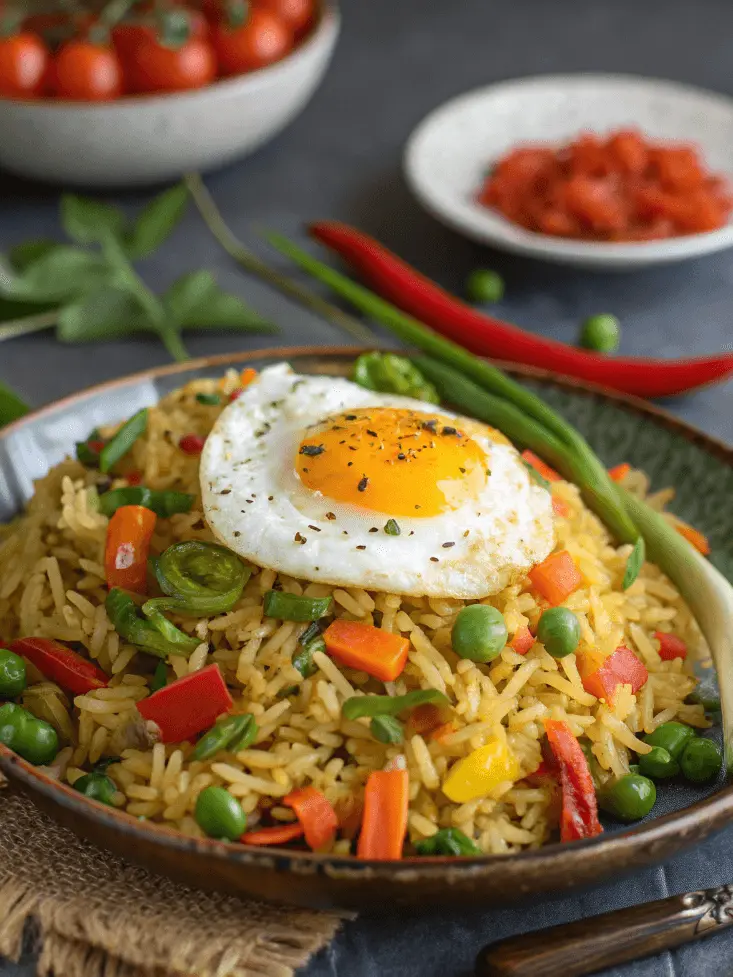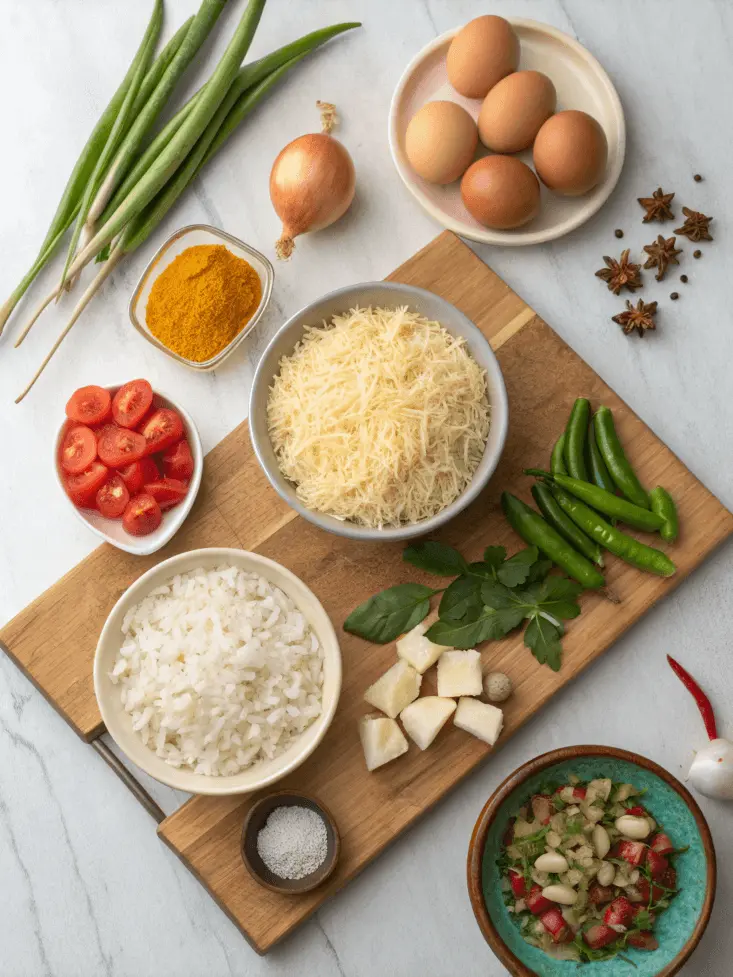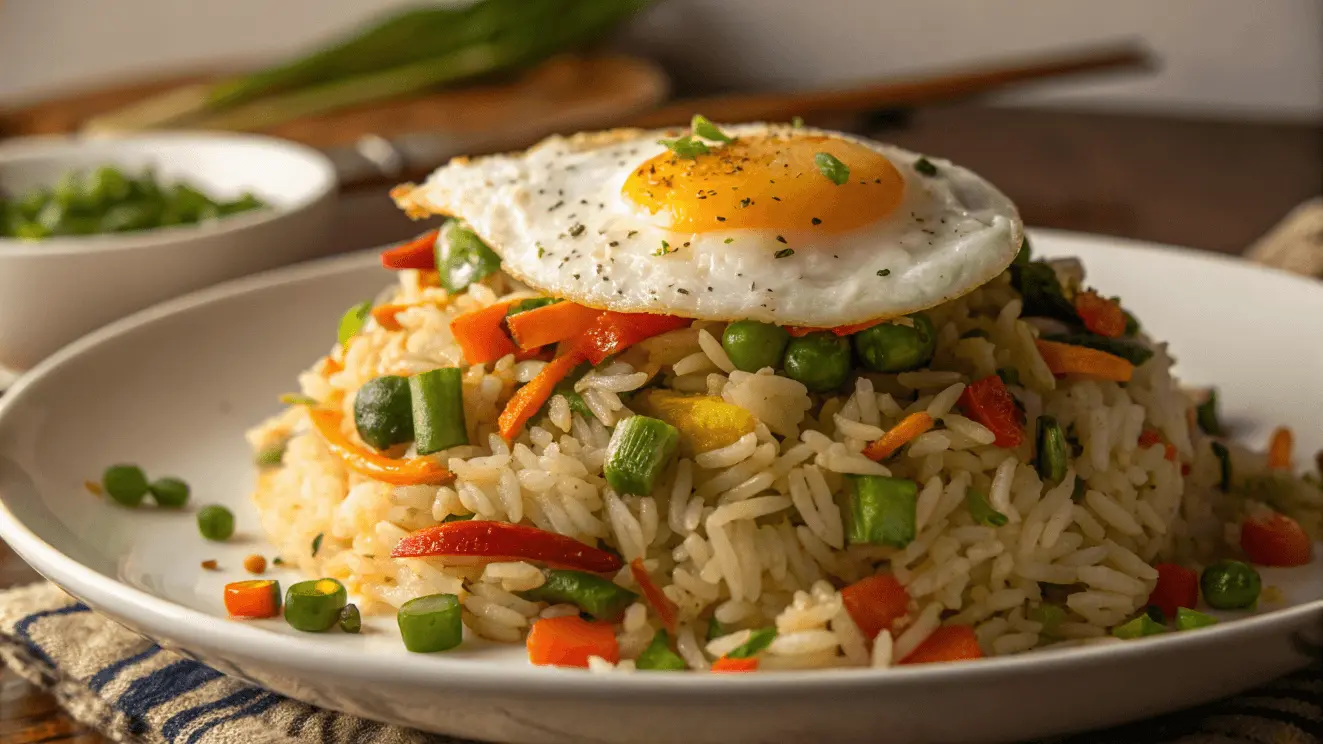Who doesn’t love a plate of perfectly spiced, restaurant-style fried rice? The problem is, most homemade versions lack that rich, smoky flavor and irresistible texture. But don’t worry—this Anjappar egg fried rice recipe is here to change that! It’s packed with bold South Indian flavors, fluffy eggs, and just the right amount of heat. Plus, it’s quick to make and way better than takeout. First, you’ll learn the secret to getting perfectly cooked rice. Next, you’ll discover how to balance spices for that authentic Anjappar taste.
The best part? This recipe is totally customizable, so you can tweak it to your liking. Want it spicier? Add extra chilies. Need a protein boost? Toss in more eggs. Also, it’s great for meal prep and stays fresh when reheated. So, grab your wok, fire up the stove, and get ready to cook the most flavorful egg fried rice ever! Let’s dive in!
Table of Contents
What Makes Anjappar Egg Fried Rice Unique?

The Signature Flavors That Define This Dish
Anjappar egg fried rice is all about bold, authentic South Indian flavors. The secret lies in the perfect balance of aromatic spices, fluffy eggs, and smoky stir-fried rice. Unlike regular fried rice, this dish has a distinct Chettinad-style seasoning that adds depth and warmth.
First, the eggs are perfectly scrambled with a mix of ginger, garlic, and green chilies, giving the dish a subtle heat. Then, a blend of freshly ground spices like cumin, fennel, and black pepper infuses every bite with a rich, slightly smoky taste. The addition of finely chopped onions and capsicum provides a delightful crunch, enhancing both texture and flavor.
Another key element? Basmati rice. Its long grains remain light, fluffy, and non-sticky, making every bite enjoyable. Unlike short-grain rice, it absorbs the spices well without turning mushy. Also, the right stir-frying technique ensures each grain is coated with the seasoning while maintaining its separate texture.
To add even more umami, a splash of soy sauce and chili sauce ties everything together. This combination enhances the dish without overpowering the authentic Chettinad taste. And let’s not forget fresh coriander and spring onions sprinkled at the end! These simple garnishes brighten the dish, giving it a burst of freshness.
Here’s what makes Anjappar egg fried rice stand out in flavor:
| Key Flavor Element | Why It’s Important |
|---|---|
| Eggs & Spices | Adds richness, warmth, and a smoky taste |
| Fresh Ginger & Garlic | Enhances aroma and depth of flavor |
| Basmati Rice | Keeps the dish light and non-sticky |
| Capsicum & Onions | Provides crunch and balance |
| Soy Sauce & Chili Sauce | Enhances umami without overpowering the spices |
This unique combination makes every bite flavor-packed, satisfying, and restaurant-worthy. If you love fried rice with bold, well-balanced flavors, this dish is a must-try!
if you’re a fan of robust flavors, you might also love this beef cheek meat recipe, which uses slow cooking to achieve a melt-in-your-mouth texture!
How It Stands Out from Other Egg Fried Rice Styles
Anjappar egg fried rice is completely different from the usual fried rice varieties you may have tried. First, it leans heavily on Indian-style seasoning rather than Chinese flavors. While most fried rice recipes use just soy sauce and eggs, this version adds a rich blend of spices that make it distinctly flavorful.
Another major difference is the stir-frying technique. Many fried rice dishes use high heat and a quick toss, but Anjappar-style egg fried rice requires slow cooking for maximum spice infusion. The eggs are lightly scrambled with turmeric and masala, giving them a deep, golden hue before they mix into the rice.
The choice of rice also sets it apart. Chinese-style egg fried rice typically uses short-grain or jasmine rice, which gives it a soft, slightly sticky texture. In contrast, Anjappar egg fried rice always uses basmati rice, ensuring that every grain stays separate and fluffy.
Here’s a side-by-side comparison to highlight the differences:
| Feature | Anjappar Egg Fried Rice | Other Egg Fried Rice Styles |
|---|---|---|
| Main Seasoning | Indian spices (turmeric, black pepper, cumin) | Soy sauce, oyster sauce |
| Cooking Method | Slow stir-frying for deep flavor | Quick toss on high heat |
| Egg Preparation | Scrambled with masala and turmeric | Lightly fried with minimal seasoning |
| Rice Type | Basmati rice (long grain, non-sticky) | Short-grain or jasmine rice |
| Extra Ingredients | Capsicum, green chilies, fresh coriander | Peas, carrots, spring onions |
Also, Anjappar egg fried rice has a subtle kick from chilies and black pepper. Unlike Chinese fried rice, which has a mild, soy-sauce-forward taste, this version carries layers of warmth and spice in every bite.
So, if you’re looking for a fried rice dish that’s flavorful, bold, and packed with aromatic spices, this one is for you. It’s an explosion of taste, and once you try it, you’ll never look at regular egg fried rice the same way again!
Essential Ingredients for Authentic Anjappar Egg Fried Rice

Choosing the Right Rice for Perfect Texture
The foundation of Anjappar egg fried rice recipe is the rice itself. Choosing the right type ensures a light, fluffy, and non-sticky texture, making every bite enjoyable. The best option? Basmati rice! This long-grain variety has a natural fragrance and stays perfectly separate when cooked.
First, rinse the rice well. This removes excess starch, preventing it from turning sticky. Next, cook it until just tender—not too soft! The rice should hold its shape but still absorb all the flavors from the stir-frying process. Once cooked, let it cool completely before using it in the recipe. Hot rice straight from the pot can become mushy when fried.
For the perfect fried rice texture, follow these key steps:
| Step | Why It’s Important |
|---|---|
| Use aged basmati rice | Has lower moisture, making it fluffier |
| Rinse thoroughly | Removes excess starch to prevent stickiness |
| Cook until just tender | Ensures grains remain separate when fried |
| Cool before stir-frying | Hot rice can turn mushy in the pan |
| Use day-old rice if possible | Drier rice absorbs flavors better |
Want even better results? Spread freshly cooked rice on a tray and let it air dry for 30 minutes before using. This keeps the grains firm and helps them soak up all those delicious spices.
Must-Have Spices and Aromatics for a Bold Taste
Spices are what give Anjappar egg fried rice recipe its signature bold, smoky, and slightly spicy flavor. Unlike plain fried rice, this version relies on a rich blend of Indian spices to bring out its unique taste.
First, turmeric powder adds a golden hue while enhancing the depth of flavor. Next, black pepper gives the dish a warm, slightly fiery kick. Cumin and fennel seeds bring in a hint of earthiness, while red chili flakes take the heat up a notch. These spices work together to infuse the rice with layers of flavor.
Aromatics are just as important. Fresh ginger and garlic provide warmth and a deep, savory richness. Green chilies bring an extra level of spice, making every bite exciting. And let’s not forget onions and capsicum! These veggies add crunch and balance to the dish.
Here’s a breakdown of the essential spices and aromatics:
| Ingredient | Role in the Dish |
|---|---|
| Turmeric Powder | Adds color and a mild earthy flavor |
| Black Pepper | Provides a smoky heat that complements the eggs |
| Cumin Seeds | Enhances depth with a warm, nutty taste |
| Fennel Seeds | Adds a slight sweetness and balances spice |
| Red Chili Flakes | Gives an extra kick of heat |
| Ginger & Garlic | Boosts flavor and adds depth |
| Green Chilies | Brings fresh heat to the dish |
| Onions & Capsicum | Adds crunch and balances the spices |
For best results, toast the cumin and fennel seeds in oil before adding the other ingredients. This releases their natural oils and intensifies the flavor.
- Want a milder version? Reduce the black pepper and skip the red chili flakes.
- Love it extra spicy? Add more green chilies or a pinch of cayenne.
- Prefer more depth? Try adding a dash of garam masala for a richer taste.
By combining the right rice with these bold spices and fresh aromatics, you’ll create an authentic Anjappar egg fried rice recipe that’s packed with flavor and restaurant-worthy!
If you enjoy hearty meals, you might also want to check out the difference between baked ziti and lasagna—two comforting pasta dishes that are just as satisfying as this fried rice.
Pro Tips for Cooking Perfect Anjappar-Style Egg Fried Rice
The Right Way to Scramble Eggs for Even Flavor
Getting the eggs just right is key to making a perfect Anjappar egg fried rice recipe. If the eggs are too dry, they lose their soft texture. If they are undercooked, they won’t mix well with the rice. The goal is to create soft, fluffy, and evenly distributed eggs that blend seamlessly into every bite.
First, crack the eggs into a bowl and whisk them well. Adding a pinch of salt and a dash of black pepper at this stage helps bring out the flavor. Next, heat a pan with a little oil or butter over medium heat. Once the oil is warm, pour in the beaten eggs and let them sit for a few seconds before stirring. This allows the eggs to set slightly, creating soft curds instead of tiny crumbles.
Gently push the eggs from the edges toward the center using a spatula. Avoid over-stirring, as this can break the eggs into very small pieces, making them disappear into the rice. Once the eggs are about 80% cooked, remove them from the pan and set them aside. They will finish cooking when mixed with the rice later, preventing them from becoming rubbery.
Here’s a quick breakdown of how to scramble eggs for fried rice:
| Step | Why It’s Important |
|---|---|
| Whisk eggs with salt & pepper | Enhances flavor and ensures even seasoning |
| Use medium heat | Prevents eggs from cooking too fast or burning |
| Let eggs set before stirring | Creates fluffy curds instead of small crumbles |
| Push eggs gently with a spatula | Helps maintain soft, tender texture |
| Remove when 80% cooked | Prevents overcooking and dryness |
Perfectly scrambled eggs add richness and balance to the dish. Follow these steps, and you’ll get flavorful, well-integrated eggs in every bite!
If you’re planning a complete meal, pair this dish with something creamy and rich, like pumpkin pie made with condensed milk—a dessert that’s perfect for rounding out a flavorful dinner.
Mastering the Stir-Fry Technique for Restaurant Quality
A proper stir-frying method is what gives this Anjappar egg fried rice recipe its signature smoky, bold flavor. The technique affects everything—from how well the rice absorbs the spices to how fluffy and separate the grains remain.
The first step is using the right pan. A wok or large frying pan is ideal because it allows for even heat distribution. Next, always start with high heat. This helps seal in the flavors while giving the rice that delicious, slightly smoky edge.
Once the pan is hot, add oil and heat it until shimmering. Toss in aromatics like ginger, garlic, and green chilies, stirring quickly to release their flavor. Then, add pre-cooked rice in batches instead of dumping it all at once. This ensures even coating with spices and seasonings.
While stir-frying, use a tossing motion instead of just stirring. This technique helps keep the grains from breaking while evenly distributing the seasoning. If you want to achieve restaurant-style fried rice, don’t over-stir! Let the rice sit for a few seconds before tossing again.
Here are some extra tips to nail the stir-fry technique:
- Use a wok or a wide pan – More surface area prevents overcrowding.
- Keep the heat high – This gives the rice a slightly charred, smoky taste.
- Drizzle oil along the sides of the pan – Helps coat the rice evenly.
- Add soy sauce or chili sauce at the end – This keeps flavors fresh and balanced.
- Stir-fry in small batches – Overcrowding the pan makes the rice mushy.
Here’s a quick comparison of common stir-fry mistakes vs. correct techniques:
| Mistake | Correct Method |
|---|---|
| Using a small pan | Use a wide wok or large frying pan |
| Cooking on low heat | Always stir-fry on high heat |
| Adding too much rice at once | Stir-fry in small batches for even coating |
| Over-stirring the rice | Toss the rice gently to prevent breaking |
| Adding sauce too early | Add sauces at the end to maintain fresh flavor |
Mastering this stir-frying method will give you authentic, restaurant-style Anjappar egg fried rice that’s packed with flavor and perfect texture. Try it once, and you’ll never settle for soggy fried rice again!
Customizing Your Egg Fried Rice for More Variety
Protein Additions – Chicken, Shrimp, or Vegetarian Twists

One of the best things about this Anjappar egg fried rice recipe is how easily you can customize it! Whether you want to add extra protein or keep it vegetarian, there are plenty of delicious options.
For a hearty, protein-packed version, adding chicken or shrimp works beautifully. If using chicken, go for boneless, skinless pieces. First, marinate them with salt, pepper, and a pinch of turmeric for extra flavor. Then, stir-fry until golden before adding to the rice. Shrimp is another great option. It cooks quickly and absorbs all the spices, making every bite juicy and flavorful.
Prefer a vegetarian twist? Swap the protein for tofu, paneer, or mushrooms. Tofu and paneer soak up the spices, adding a rich and satisfying bite. Mushrooms, on the other hand, bring an umami-packed depth of flavor.
Here’s a quick protein comparison to help you choose:
| Protein Option | Best Cooking Method | Flavor Profile |
|---|---|---|
| Chicken | Stir-fried with spices | Savory and filling |
| Shrimp | Quick sauté with seasoning | Juicy and slightly sweet |
| Tofu | Pan-fried or stir-fried | Absorbs flavors well |
| Paneer | Cubed and lightly sautéed | Rich and creamy |
| Mushrooms | Stir-fried until golden | Earthy and umami-rich |
No matter which protein you choose, always cook it separately first to ensure it’s well-seasoned before mixing it with the rice. This keeps the flavors balanced and prevents the dish from becoming soggy.
Adjusting Spice Levels for Mild, Medium, or Spicy Versions
The spice level of this Anjappar egg fried rice recipe is totally customizable! Whether you love a mild, balanced flavor or a fiery kick, adjusting the spices is simple.
For a mild version, reduce the black pepper and chili flakes. Stick to basic seasonings like turmeric, cumin, and a little garlic. This keeps the dish flavorful without too much heat. If making it for kids, skip the green chilies entirely and add a touch of honey to mellow out the flavors.
For a medium-spiced version, use a balanced mix of black pepper, red chili flakes, and green chilies. This creates a warm, aromatic heat without overwhelming the dish. Adjust based on your preference by adding chilies in small amounts.
For a spicy version, go all out with extra chili flakes, chopped green chilies, and a pinch of cayenne pepper. Want an even bigger kick? Add a drizzle of chili oil or a spoonful of spicy Schezwan sauce at the end. This brings in a bold, smoky heat that spice lovers will enjoy!
Here are some easy spice level adjustments to follow:
- For mild: Reduce black pepper, skip chili flakes, and avoid green chilies.
- For medium: Use a moderate amount of black pepper and chili flakes.
- For spicy: Add extra green chilies, red chili flakes, and a dash of cayenne.
- For extra heat: Drizzle chili oil or add a spoonful of spicy sauce.
Here’s a spice level guide to help customize your dish:
| Spice Level | Key Ingredients | Best for |
|---|---|---|
| Mild | Less black pepper, no chilies | Kids & those who prefer subtle spice |
| Medium | Balanced black pepper & chili flakes | Those who enjoy some heat but not too much |
| Spicy | Extra chilies & red chili flakes | Spice lovers who like bold heat |
| Extra Spicy | Chili oil, cayenne, extra peppers | Fans of fiery, restaurant-style spice |
With these simple tweaks, you can enjoy this Anjappar egg fried rice recipe at your perfect spice level. Whether you love gentle warmth or fiery heat, it’s easy to adjust. Just taste as you go, and have fun making it your own!
Storage, Reheating, and Meal Prep Hacks
The Best Way to Store Leftovers Without Losing Freshness
Storing your Anjappar egg fried rice recipe the right way ensures it stays fresh, flavorful, and just as delicious as when you first made it. The key to keeping the texture perfect is preventing moisture buildup and avoiding soggy rice.
First, always let the rice cool completely before storing it. Hot rice releases steam, which turns into moisture, making it mushy. Next, transfer the rice to an airtight container. This prevents it from drying out while also keeping it from absorbing odors from the fridge.
For best results, divide the rice into smaller portions before storing. This makes it easier to reheat just what you need without exposing the entire batch to temperature changes.
Here’s the best way to store fried rice properly:
| Storage Method | Best Container | Shelf Life |
|---|---|---|
| Refrigerator (short-term) | Airtight container | 3–4 days |
| Freezer (long-term) | Freezer-safe ziplock bag | Up to 2 months |
Want to freeze leftovers? Spread the rice on a baking sheet first, let it freeze, and then transfer it to a ziplock bag. This prevents it from clumping together, making reheating much easier!
Quick and Easy Reheating Methods for the Best Taste
Reheating Anjappar egg fried rice recipe the wrong way can make it dry, rubbery, or even soggy. But don’t worry—using the right technique keeps it light, fluffy, and just as tasty as when it was freshly made.
The best reheating method depends on how much time you have:
- Stovetop (best method) – Add a little oil to a pan, then stir-fry the rice over medium heat for 3–4 minutes. This restores the texture while keeping it moist.
- Microwave (quick fix) – Place the rice in a microwave-safe bowl, cover with a damp paper towel, and heat in 30-second bursts, stirring between intervals.
- Oven (for large batches) – Spread the rice on a baking sheet, cover with foil, and bake at 300°F (150°C) for 10 minutes.
Here’s a quick comparison of reheating methods:
| Reheating Method | Best For | Time Needed |
|---|---|---|
| Stovetop | Best texture, prevents dryness | 3–4 minutes |
| Microwave | Fastest option, good for small portions | 1–2 minutes |
| Oven | Great for large batches | 10 minutes |
Extra tips for the best reheating experience:
- Sprinkle water over the rice before reheating to restore moisture.
- Use a little oil while stir-frying to bring back its glossy, fresh texture.
- Avoid reheating multiple times—only warm up what you plan to eat.
With these simple storage and reheating hacks, your Anjappar egg fried rice recipe will always taste as fresh as the day you made it. Whether it’s a quick weekday meal or a prepped lunch, you’ll have delicious, flavorful fried rice ready in no time!
Now that you’ve got all the tips, tricks, and secrets to perfect Anjappar egg fried rice, it’s time for the fun part—cooking! Grab your ingredients, fire up the pan, and let’s whip up this flavorful, restaurant-style dish in just a few easy steps!

authentic anjappar egg fried rice recipe
Ingredients
- 2 cups cooked basmati rice
- 4 large eggs
- 2 tbsp oil preferably sesame or vegetable oil
- 1 small onion finely chopped
- ½ cup capsicum finely chopped
- 2 2 green chilies slit
- 1 tbsp soy sauce
- ½ tsp black pepper powder
- ½ tsp cumin seeds
- Salt to taste
- 1 tbsp chopped coriander leaves
Instructions
- Heat the oil – First, heat 2 tablespoons of oil in a wok or large pan over medium-high heat. Once it’s hot, add cumin seeds and let them sizzle for a few seconds. This releases their flavor.
- Scramble the eggs – Next, pour in the whisked eggs and cook until soft and fluffy. Stir gently to create larger egg pieces. Once done, remove them from the pan and set them aside.
- Sauté the aromatics – Add chopped onions, green chilies, and capsicum to the same pan. Stir-fry until the onions turn golden and fragrant. This builds the base flavor.
- Add the rice and seasonings – Now, add the cooked rice, black pepper, salt, and soy sauce. Stir-fry everything together on high heat for 2-3 minutes, ensuring the rice absorbs all the flavors.
- Mix in the eggs and garnish – Finally, add the scrambled eggs back into the pan. Toss everything together until well combined. Sprinkle chopped coriander on top and serve hot!
Notes
- Use day-old rice – Freshly cooked rice can turn mushy. If possible, use cold, leftover rice for the best texture.
- Don’t over-stir the eggs – Keep them fluffy by cooking them separately and mixing them in at the end.
- Cook on high heat – High heat gives fried rice a slight smokiness and keeps the grains separate.
- Customize your spice level – Add extra green chilies or chili flakes if you love spicy food. Reduce the spice for a milder version.
- Storage tip: Store leftovers in an airtight container in the fridge for up to 3 days. Reheat on the stovetop or in the microwave with a splash of water to keep it moist.
Conclusion: Bring the Authentic Taste of Anjappar to Your Kitchen
Cooking this Anjappar egg fried rice recipe at home is easier than you think. With just a few simple ingredients, you can create a dish bursting with bold flavors. The combination of fluffy basmati rice, perfectly scrambled eggs, and aromatic spices makes every bite irresistible.
First, choosing the right rice ensures the best texture. Next, using fresh spices enhances the deep, smoky flavors. Also, mastering the stir-fry technique gives the dish that perfect restaurant-style finish. Every step adds something special to the final dish.
The best part? You can customize it to your liking. Add extra spice for heat, mix in more veggies, or keep it mild. However you make it, this dish will always be a crowd-pleaser.
So, why wait? Grab your ingredients, fire up the pan, and enjoy a delicious plate of Anjappar egg fried rice right at home!


1 thought on “5 Easy Steps to Make Anjappar Egg Fried Rice at Home!”